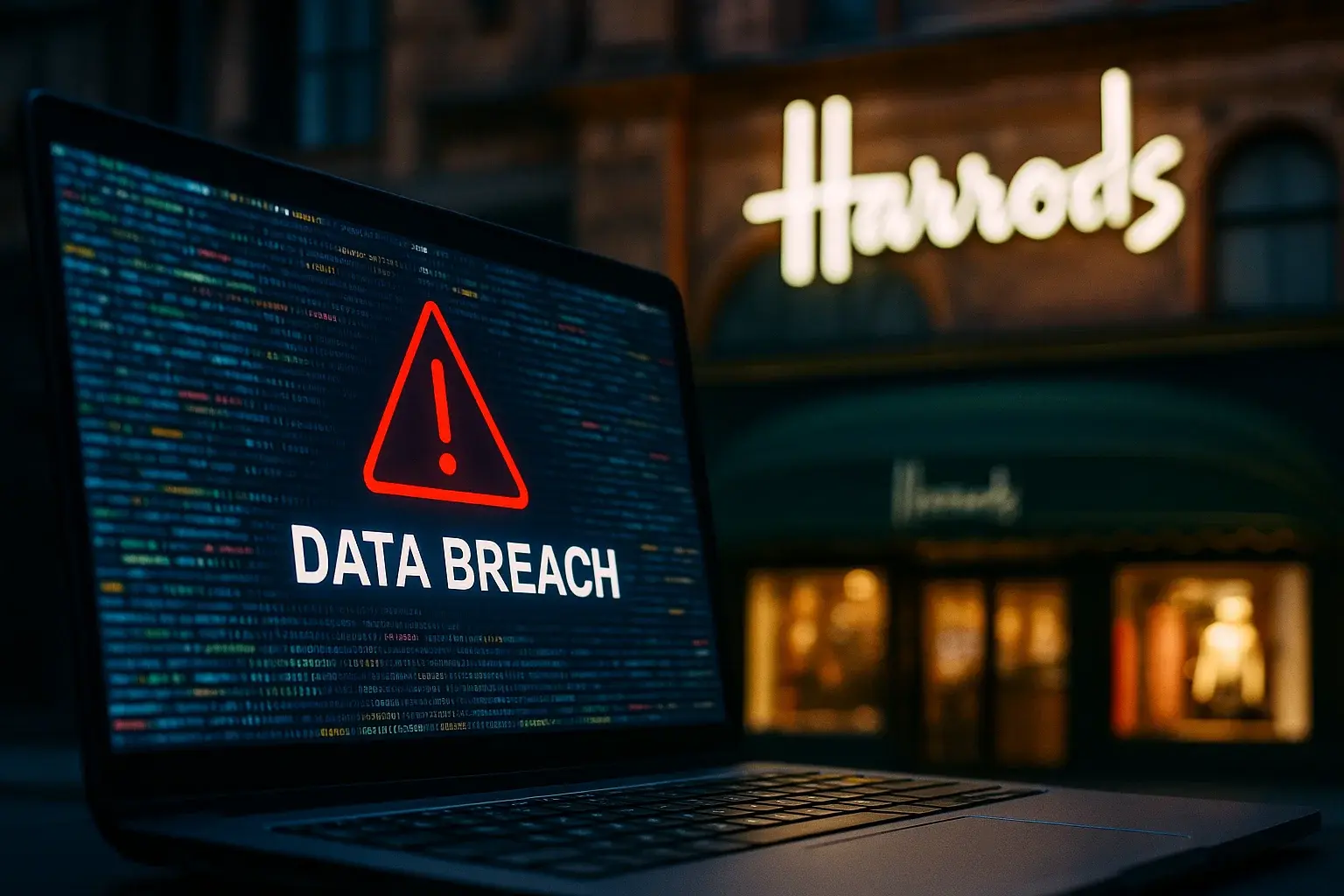Data security is once again at the center of attention. This time, the spotlight is on Harrods, the iconic London luxury department store, which confirmed a new cybersecurity incident exposing 430,000 customer records from its e-commerce platform.
If you think this is an isolated case, think again: cybercriminals are increasingly exploiting the weaknesses of third-party providers to attack large enterprises directly. At TecnetOne, we believe this episode should serve as a reminder of how vulnerable organizations can be—even those with decades of reputation and substantial cybersecurity resources—if they lack robust third-party risk management strategies and well-defined incident response plans.
What Happened at Harrods?
The attack originated through an external vendor. This wasn’t a direct breach of Harrods’ internal systems, but rather a vulnerability in its digital supply chain. Such attack vectors are becoming more common, as many companies rely on third parties to manage critical data, services, and operations.
After discovering the intrusion, Harrods notified affected customers and confirmed that the compromised data included:
- Full names
- Contact details (email, phone, address)
- Internal marketing and service tags, such as membership levels or co-branded card affiliations
Although Harrods clarified that no passwords, purchase histories, or payment data were leaked, having your name and contact details in the hands of cybercriminals is enough to expose you to serious risks like targeted phishing, identity theft, and even extortion attempts.
Read more: Salesforce Data Breach Hits Google, Adidas, Chanel, and More
A Recent History of Attacks
This isn’t Harrods’ first brush with cybercrime. In May 2025, the company was targeted by Scattered Spider, a group notorious for deploying ransomware at scale. On that occasion, Harrods responded quickly and prevented attackers from breaching its systems.
But this new incident proves attackers don’t give up easily—and that a weak link, such as a poorly protected vendor, can open a dangerous door.
Why This Attack Matters
Even though Harrods stressed that no passwords or payment details were stolen, the exposure of personally identifiable information (PII) is a serious threat in itself. With this data, cybercriminals can:
- Launch targeted phishing campaigns, posing as Harrods or other trusted companies.
- Commit identity fraud by opening accounts or requesting services in a victim’s name.
- Map consumer habits, enabling more sophisticated campaigns in the future.
Harrods also confirmed that the attackers contacted them directly, suggesting an attempt at corporate extortion.
The Human Factor: Social Engineering
One of the immediate risks after such a leak is phishing. Criminals can craft emails that appear legitimate, using real customer details to boost credibility.
For example, they could send you an email with your name, asking you to “confirm your account” or “reset your password” through a fake link. Even though Harrods confirmed that no passwords were stolen, attackers will try to trick you into handing them over yourself.
What You Can Do as a Harrods Customer
At TecnetOne, we always recommend practical steps after a data breach:
- Be cautious with suspicious emails or SMS claiming to come from Harrods. Never click questionable links.
- Regularly monitor your financial accounts for unusual activity.
- Enable multi-factor authentication (MFA) across your online services, even if your password wasn’t exposed.
- Change your passwords periodically, especially if you reuse them across platforms.
- Use a password manager to avoid reusing credentials.
The Supply Chain Factor in Cyberattacks
A key detail in this case is that the attack didn’t penetrate Harrods’ systems directly—it came through a compromised external vendor.
This type of attack is increasingly common and devastating. Just think of SolarWinds or Kaseya, where thousands of companies were affected because a third party was breached.
In cybersecurity, you’re only as strong as your weakest link—and that link often lies outside your direct control: your vendors.
Lessons for Your Organization
If you manage customer data or rely on multiple technology providers, Harrods’ case is a reminder that you must:
- Demand strict security policies from your vendors and audit compliance.
- Include security clauses in third-party contracts.
- Continuously monitor your digital supply chain.
- Have incident response plans that account for external breaches.
At TecnetOne, we help clients implement third-party risk management strategies, ensuring you don’t depend solely on the goodwill or strength of your providers.
Learn more: Google Hit by Data Breach Following Salesforce Attacks
What’s at Stake
The consequences of an attack like this aren’t just technical:
- Reputational damage: for a luxury brand like Harrods, customer trust is everything.
- Legal and regulatory costs: data protection laws (like GDPR) require disclosure and may trigger hefty fines.
- Loss of customers: in a competitive market, consumers may decide to move their loyalty elsewhere.
How TecnetOne Can Help
At TecnetOne, we know cybersecurity is no longer optional. Incidents like Harrods’ show that no organization is immune, and attackers always look for the easiest entry point—stolen credentials, unpatched systems, or careless vendors.
That’s why we provide services such as:
- 24/7 monitoring of threats and vulnerabilities
- Incident response and rapid containment
- Third-party and vendor cybersecurity audits
- Phishing and social engineering awareness training
- Proactive threat hunting to stop attackers before they strike
Our mission is simple: to help you protect your data, your customers, and your reputation.
Conclusion
Harrods’ breach isn’t just an isolated case at a luxury store—it’s a reminder of how fragile today’s digital ecosystems really are. Cybercriminals know they don’t need to go through the front door if a vendor leaves a window open.
As a customer, you must stay vigilant against phishing attempts. As a business, you must reinforce your cybersecurity strategy end-to-end, including your supply chain.
At TecnetOne, we’re here to help you achieve that, because your digital security can’t wait.


